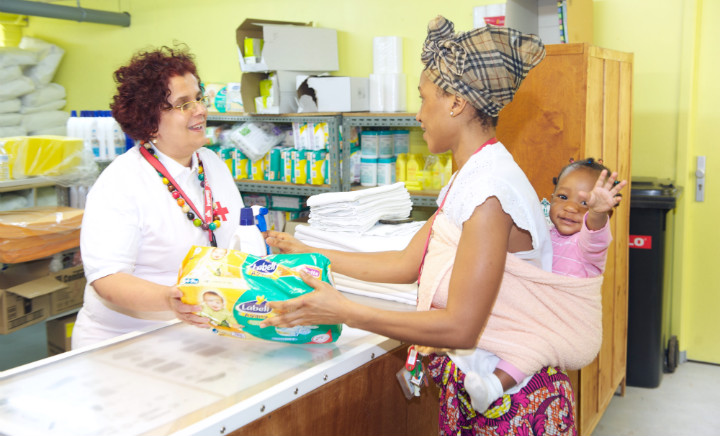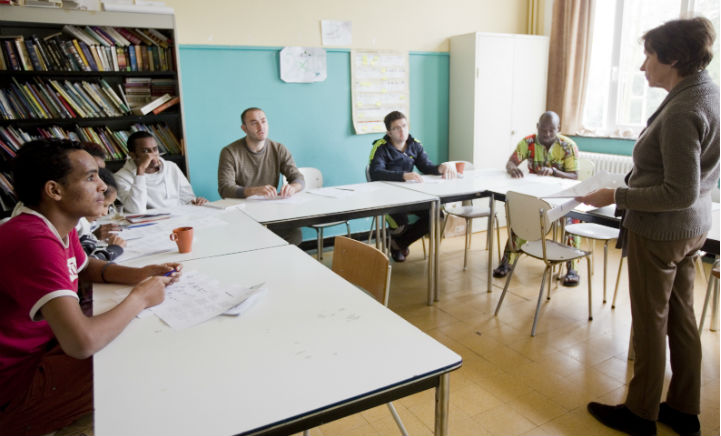Specialised care at Belgian reception centres for asylum seekers
Recent years have seen extra pressure on reception facilities across the EU, as an increased number of people have been forced to flee their homes and seek protection in Europe. With many Member States insufficiently prepared for the influx, the special needs of asylum seekers have not always been identified and addressed. This has resulted in avoidable suffering, and jeopardised the dignity of large numbers of asylum seekers throughout the Union.
National Red Cross Societies in the EU have a long-standing history of working with and for asylum seekers. They facilitate the reception of many people, and have established professional systems to provide psychosocial assistance, education, training, and other support to asylum seekers upon their arrival in a European country. These services are founded on respect for asylum seekers’ dignity, integrity, and freedom of movement.

In Belgium, the Red Cross runs a total of 35 reception centres, capable of housing more than 8,000 asylum seekers. These provide asylum seekers with a safe place to reside from the moment they enter the country and submit an asylum claim with national authorities, to when they receive a response – be it positive or negative. In addition, the Belgian Red Cross runs a range of social services, such as access to crucial information and administrative support during all phases of the asylum application procedure. Basic support, like meals, bedding, toiletries, and a weekly allowance for personal expenses, are also provided.
Centres are located in both urban and rural areas across Belgium, and vary in their capacities and areas of expertise. Some specialise in housing and adapted services for unaccompanied minors, for instance. “Developing adapted approaches and mechanisms to assess the needs of asylum seekers is crucial for their well-being and future,” stresses Tim Buyck, Migration Officer at the Belgian Red Cross Flanders. “When it comes to unaccompanied minors, it is important to provide them with some stability and regularity, for example by guaranteeing their access to education,” he adds.

The “Centre d'accueil rapproché pour demandeurs d'asile” (CARDA) reception centre in Wallonia focuses on providing specialised support to people facing psychological difficulties. Those seeking asylum in Europe have often faced war, persecution, or extreme poverty in their home countries. Many have also spent months or years in transit countries, where displacement, destitution and uncertainty about their future have been part of their daily realities. Living under these circumstances often increases people’s vulnerability to abuse and neglect, and they tend to experience extreme levels of stress and trauma. As a result, post-traumatic stress disorder (PTSD) and similar conditions are widespread among people who have been forcibly displaced. Prolonged stays in reception centres and uncertainty regarding the outcome of asylum procedures can also significantly increase mental suffering and disorders.
The CARDA centre was created in 2007 to meet the specific psychological needs of asylum seekers that derive from their experiences before, during and after they fled their homes. It can accommodate up to 40 people, including families, couples, and individuals, with five places reserved exclusively for unaccompanied minors. The centre offers counselling, and treatment for people suffering from depression, PTSD, psychosomatic symptoms, and behavioural problems, while people facing more severe psychiatric issues are referred to psychiatric hospitals. Expert staff – including psychologists, educators, nurses, and a psychometrician – carry out holistic psychological assessments and identify the most appropriate care for each asylum seeker. Mobile teams are also available to respond rapidly to urgent cases. Furthermore, the CARDA centre trains staff in other reception centres to spot the signs of potential psychological problems.
Basic information
Activity name
Centre d'accueil rapproché pour demandeurs d'asile (CARDA)
Country
Belgium
Partners
Belgian Red Cross

